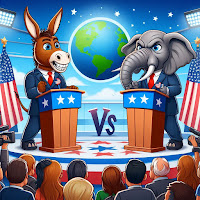Antonio Cilardo
8/16/2025
Be crude, buddy. The impact of swearing in daily life and brand communication
12/27/2024
What Ottoman calligraphers can teach us about AI
"History teaches, but it has no pupils," claimed the Marxist philosopher Antonio Gramsci.
It's hard to disagree, particularly when the frontiers of digital innovation stir up ancient fears.
Over the past two years, the acceleration of artificial intelligence has disrupted every facet of our lives.
New professions have emerged, while many traditional ones fear being wiped out, especially in the creative field: their concerns are not unfounded.
10/27/2024
Kamala Harris, Donald Trump, and the sly charm of underdogs
5/29/2024
Stay modest, stay humble. Kudos to brands that acknowledge their mistakes
Even the most seasoned brands can make embarrassing blunders.
Recently, Apple had to apologize for a somewhat dystopian iPad Pro ad that hinted at the destruction of creativity.
Bumble, the dating app, withdrew its ads that mocked celibacy and abstinence among its female audience.
Beauty brand Youthforia faced a lot of criticism for a foundation shade that was considered not inclusive enough.




